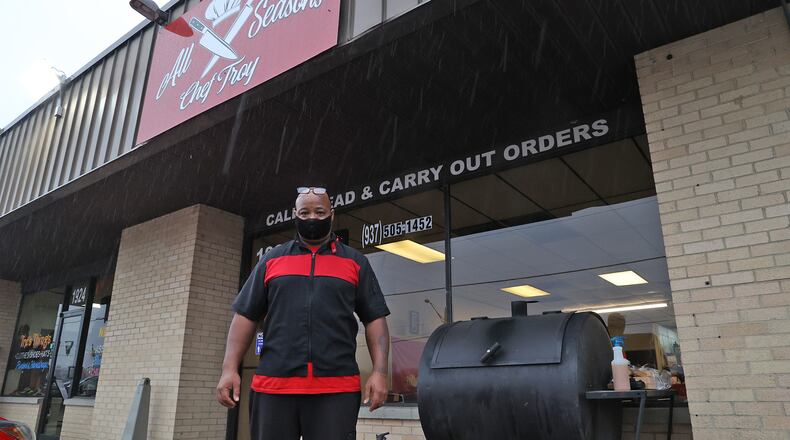With the coronavirus and social justice protest that erupted across the country in 2020 forcing the country to reckon with the legacy of anti-Black racism, some Springfield institutions are attempting to be more intentional in how they approach the Black business community.
That is taking the form of new programming that aims to build trust with historically underserved communities, including reaching more Black-owned businesses and those operating on the south side of Springfield.
Local community leaders and entrepreneurs that spoke to the News-Sun noted that there are resources in the area targeted at helping those businesses. However, the issue and the focus has to be on better connecting people to those opportunities as well as building trust with communities that may have been excluded from financial institutions in the past or overlooked by the broader business community.
Credit: Bill Lackey
Credit: Bill Lackey
“There are significant disadvantages being a Black business owner. So it is not enough to provide the same amount of service. Sometimes you have to actually do something different to achieve a different result,” said Rob Alexander of the Springfield Small Business Development Center.
He said that is an important approach when reaching those business communities.
COVID highlights disparities
Though the disparities have been there before the pandemic, the rate of business closures during the initial onslaught of COVID-19 in the U.S., showed how large the gap can be between Black and white owned businesses.
A study conducted in the summer of 2020 by University of California, Santa Cruz economist Robert Fairlie showed 41% of Black-owned business stated they had to stop working during the initial onslaught of the pandemic compared to 17% of white-owned businesses.
When later data showed businesses rebounding from those economic impacts, minority-owned businesses were slower to reopen. An analysis by the Associated Press in December 2020 also found that it took longer for minority owned businesses to obtain funding through the federal Paycheck Protection Program, created to aid those reeling from the pandemic.
The reasons for those disparities can be complicated and very subtle as well as unintentional, Alexander said.
Grappling with the legacies of the past
Historical legacies of exclusion and racism can put some Black businesses at a disadvantage, especially when it comes to accessing financing opportunities or just having the financial literacy required to properly run a business.
That includes some members of those communities not trusting banks or not having relationships with those who dispense loans due to perceptions that they will automatically be denied. It can also include those institutions not being culturally aware of the reasons behind some of that distrust or lack of business knowledge that disproportionally impacts certain communities, said Cheryl DeGroat Dover, minority business development coordinator for the City of Springfield.
Up and coming business owners may not know about the resources available in their own backyard. They may not know what the best approach may be when applying for a loan or have access to instructional knowledge or know someone who does.
Those can be some of the biggest reasons behind the disadvantages that some Black business owners face, said DeGroat Dover, who aims to help provide marketing, exposure, networking and certifications to minority and women-owned and lead businesses. She also serves as a resource connector.
Alexander said it is going to take time and effort to address those issues as well as acknowledging some of the historical legacies contributing to those problems. In addition to that, it also means some Black businesses may have trouble overcoming stigma’s associated with areas they operate in or how others perceive them.
“It is easy when you have privilege to not pay attention to what is happening to those who don’t have those same privileges. What has happened over the past couple of years has forced people to really examine those disparities,” said Alexander.
He said that even when institutions are unaware of those disparities or that they may be unintentional, they still have a huge impact on those most effected. That can be seen through the access of capital that Black businesses have when compared on average to white ones.
For example, only 1.5% of the loans made by the Springfield SBDC over a five-year period went to Black businesses, something that Alexander said that he wants to change and even if he wasn’t aware of that before, he said the results are still unacceptable.
What can be done now
The local SBDC has launched a pilot program that is seeing the center partnering with nine grass roots organizations that already work with various historically underserved communities in the city and county.
This followed news in the fall that the Springfield SBDC had been awarded $1 million to better support business owners and entrepreneurs.
That funding is in the form of a grant from the U.S. Small Business Administration and is to used for the launch and support of a two year pilot program.
As a result nine Community Navigator positions have been created to help build trust and connect more businesses and aspiring entrepreneurs to services such as financial and business coaching as well as access to capital.
Three navigators have been tasked with serving the Black community and business on the southside of Springfield.
Other communities that are being targeted by the program, include immigrant businesses, rural businesses as well as those stared by those returning from incarceration.
The bulk of that work is serving as a connector of resources and providing knowledge needed for businesses to succeed.
A lot of the outreach is centered on those within those communities building trust and fostering relationships.
The goal is to increase the amount of grant funding and loans that those businesses have access to.
Alexander said that he wants to see at least $1 million being in doled out in terms of grants or loans by November of next year, in which the pilot program has to prove that it is having a positive impact.
Building trust, fostering relationships
DeGroat Dover said that it is important for businesses to start building relationships with institutions such as banks.
She noted that relationship building can help foster trust as well as better highlight the needs of certain small businesses.
There are also talks of building business incubators around the city, that can serve as start up spaces for up and coming businesses as well as give them room to test the market.
A scholarship program has also been formed to give entrepreneurs access to COhatch’s shared working space in downtown Springfield either for free or at a reduced rate and that can benefit Black entrepreneurs.
Credit: Bill Lackey
Credit: Bill Lackey
But networking and sharing of resources is still a top focus for some Black business owners that are working to create networking opportunities.
Aaron Clark, who owns an online Christian apparel company, said that a lack of knowledge or access to resources that are in the community remains a huge barrier for a lot of his fellow entrepreneurs.
A potential remedy is fostering an environment where those businesses can help support each other and more successful ones can share their knowledge and resources with others.
Clark said there is still a long way to go, but efforts have been made and he is actively working on creating and fostering a network of those businesses.
An example of another group working to build relationships is the Young Black Professionals and Businesses of Springfield that aims to rally support towards Black entrepreneurs.
One business that has benefited from efforts to show support through word of mouth as well as through local purchasing power includes All Seasons on Mitchell Boulevard.
The restaurant was started by Chef Troy Wheat, who worked in the fine dining circuit in Columbus for over 15 years, and his wife Nina. The restaurant aims to offer a diverse culinary experience rooted in home cooking and family meals.
Credit: bill
Credit: bill
It opened in December of 2020, and is solely supported financially by the couple. They did not apply for COVID assistance and instead said that they have been able to survive the pandemic due to community support.
Nina said that networking and efforts to support local Black owned businesses have benefitted them immensely.
However, they still have their challenges. But Nina said they have been lucky so far.
She said that word of mouth advertising and community love has been successful for them thus far and pointed to groups such as the Young Black Professionals for helping fostering that support.
Credit: Natalie Jones
Credit: Natalie Jones
About the Author





